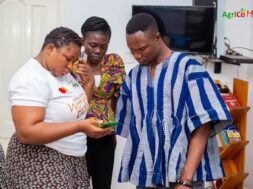Ghana Social Enterprise Forum 2025: Ethics, Innovation, and the Future of Social Entrepreneurship

Social Enterprises Driving Africa’s Growth
Ghana’s entrepreneurial landscape continues to evolve, with social enterprises at the heart of this transformation. These mission-driven businesses are redefining how innovation, ethics, and social impact come together to solve Africa’s most pressing challenges.
The Ghana Social Enterprise Forum 2025, set to take place at the British Council in Accra on Thursday, 13th November 2025, brings together thought leaders, investors, policymakers, and entrepreneurs to discuss how technology and ethics can power inclusive and sustainable growth across Africa.
This year’s forum focuses on the theme: “Ethics, Bias, Regulation, and Financing in Technology Systems for Social Impact.” It’s a timely conversation as Africa’s entrepreneurs navigate new opportunities and challenges in the era of artificial intelligence, digital finance, and sustainable innovation.
Highlights of the Ghana Social Enterprise Forum 2025
Event Overview
The 2025 forum is more than just a gathering—it’s a catalyst for collaboration and innovation. The one-day event will explore the intersection of ethics, technology, and financing, encouraging businesses to embed responsibility at the core of their operations.
With support from organizations such as the British Council, GIZ, and the Impact Investing Ghana, the event aligns with Ghana’s growing momentum in promoting inclusive entrepreneurship and responsible digital transformation.
Panel Discussion 2: Ethics, Bias, Regulation, and Financing in Technology Systems
One of the most anticipated sessions is Panel Discussion 2, which explores how ethics, bias, and regulation influence the future of technology-driven enterprises and how financing mechanisms can enhance social impact systems.
The discussion will address key questions around:
- How startups can build ethical and transparent technology systems.
- The importance of regulatory frameworks in protecting communities and data.
- Innovative ways to finance technology for social good.
This panel promises to offer fresh perspectives on balancing innovation with accountability — a challenge many African startups face today.
Meet the Panelists
The panel features a diverse lineup of experts and practitioners leading in innovation, investment, and academia:
- Isaac Quansah – Representing Social Enterprise Ghana, Isaac plays a vital role in strengthening Ghana’s social enterprise ecosystem through capacity building, advocacy, and sustainable growth partnerships.
- Justina Mensah – From Impact Investing Ghana, she focuses on unlocking finance for social enterprises, helping bridge the gap between entrepreneurs and investors committed to long-term impact.
- Eugenia Boadi – A member of the John Maxwell Leadership Team, Eugenia brings her expertise in leadership development and ethical management practices crucial for startup sustainability.
- Dr. Alexander Nuer – From the University of Cape Coast, Dr. Nuer provides academic insight into governance, policy design, and ethical technology development in Africa.
Together, they represent the collaborative spirit that defines Ghana’s entrepreneurial ecosystem.
Starting and Growing a Social Enterprise in Ghana
How to Start a Business in Ghana
Starting a social enterprise in Ghana begins with a strong vision and a clear understanding of the country’s business environment. Entrepreneurs should:
- Register their business with the Registrar General’s Department.
- Identify social impact goals that align with national and community needs.
- Leverage support programs from incubators, accelerators, and government initiatives.
- Build networks with local and international investors.
Ghana offers one of the most promising environments in Africa for purpose-driven startups, supported by a youthful population, increasing digital adoption, and growing investor interest.
Business Growth Strategies for African Entrepreneurs
African entrepreneurs are proving that success lies in collaboration, adaptability, and impact. Strategies for sustainable growth include:
- Leveraging technology for operations and scalability.
- Focusing on ethical innovation that earns public trust.
- Partnering with local communities to co-create solutions.
- Accessing regional markets through trade initiatives and investment networks like Impact Investing Ghana.
By combining social impact with profitability, entrepreneurs can build models that attract both customers and investors.
Africa’s Business Opportunity: Innovation Meets Impact
Tech for Social Good
From agritech startups improving food security to fintech solutions expanding access to finance, technology continues to redefine Africa’s development story. But with great power comes great responsibility — entrepreneurs must ensure their innovations address bias, protect data, and serve humanity.
The Ghana Social Enterprise Forum highlights how ethical technology can become a driver for equitable progress across the continent.
Investing in Ethical and Sustainable Enterprises
Investors are increasingly prioritizing startups that integrate ethics and sustainability into their models. The rise of impact investing in Ghana and beyond shows that the future of business lies not just in profits but in purpose-driven innovation.
By fostering responsible entrepreneurship and transparent governance, Africa is positioning itself as a hub for global investors seeking meaningful returns.
Building a Sustainable Future through Social Innovation
The Ghana Social Enterprise Forum 2025 exemplifies how dialogue, collaboration, and ethics can shape the next generation of African entrepreneurs. It’s a reminder that innovation must serve people first — and that sustainable progress requires integrity, empathy, and inclusivity.
As Ghana continues to nurture its startup ecosystem, entrepreneurs are proving that with the right support, Africa’s future is not just digital — it’s ethical, equitable, and impactful.
The Role of Partnerships in Scaling Social Enterprises
One of the defining strengths of Ghana’s entrepreneurial ecosystem is collaboration. Successful startups and social enterprises often thrive through partnerships that bring together public institutions, private investors, academia, and civil society organizations.
Programs supported by the British Council, GIZ, and Impact Investing Ghana have empowered many small enterprises to scale their impact beyond borders. By connecting with global partners, Ghanaian startups are now part of a broader African network — one that fosters inclusive growth, ethical technology, and innovative financing.
Such collaborations enable social entrepreneurs to:
- Access training, mentorship, and incubation programs.
- Build credibility through international partnerships.
- Gain visibility in global markets.
- Attract patient capital and sustainable investments.
The Ghana Social Enterprise Forum 2025 reinforces this vision by encouraging stakeholders to work together toward a resilient and ethical innovation ecosystem.
Empowering Youth and Women in Entrepreneurship
A central theme across all entrepreneurship events in Ghana is youth empowerment and gender inclusion. Women and young innovators are leading a new generation of problem-solvers — creating businesses that balance profit with purpose.
Through mentorship, accelerator programs, and impact-driven investments, Ghana is witnessing the rise of social enterprises led by female founders and young changemakers. Initiatives like Social Enterprise Ghana and Impact Investing Ghana have made significant progress in ensuring that women and youth gain equal access to funding and leadership opportunities.
This empowerment is not only transforming individual lives but also reshaping communities, proving that sustainable development is achievable when everyone has a seat at the table.
Entrepreneurship Success Stories: Lessons from Ghana
Ghana continues to produce inspiring success stories that demonstrate how social entrepreneurship can redefine Africa’s future. From startups using technology to address healthcare gaps to businesses driving financial inclusion and clean energy access, Ghanaian entrepreneurs are proving that impact and profitability can coexist.
These stories showcase a mindset shift — one where entrepreneurs no longer chase short-term gains but instead focus on long-term societal transformation.
The key takeaways from these success stories include:
- Building with community impact as a core metric.
- Maintaining transparency in financing and governance.
- Adopting ethical frameworks in the use of technology.
- Using innovation to solve local problems with global potential.
The 2025 forum will spotlight these trailblazers, inspiring others to pursue purpose-driven ventures across the continent.
Africa’s Next Chapter: Responsible Innovation for Shared Prosperity
Across the continent, entrepreneurs are redefining Africa’s global image — from being consumers of innovation to becoming creators of transformative technologies. However, the rise of artificial intelligence, digital finance, and data-driven systems also brings new challenges.
That’s why conversations like those at the Ghana Social Enterprise Forum 2025 are crucial. They ensure that as Africa scales its innovation economy, it also embeds ethics, inclusivity, and accountability into every layer of growth.
The goal is clear: build systems that not only scale fast but also serve society fairly. As African nations develop frameworks for responsible entrepreneurship, they are laying the groundwork for a trustworthy and sustainable digital economy.
Strengthening Ghana’s Position as a Social Innovation Hub
Ghana has positioned itself as one of Africa’s most vibrant ecosystems for social innovation. The convergence of policy reforms, youth entrepreneurship programs, and impact investment has created fertile ground for startups addressing critical challenges in education, health, agriculture, and financial inclusion.
Events like the Ghana Social Enterprise Forum 2025 are crucial milestones in this journey. They unite changemakers who are not just thinking about profits but about transformational change — using business as a tool for societal good.
By focusing on ethics, bias, and regulation, the forum invites entrepreneurs and policymakers to reflect on how emerging technologies can both empower and endanger communities if not properly managed. It emphasizes that responsible innovation must sit at the core of Africa’s digital future.
Connecting Technology, Policy, and Purpose
The intersection between technology and policy has become increasingly important in Africa’s digital economy. As AI systems, blockchain, and data analytics become mainstream, they influence everything from credit scoring to hiring decisions — raising complex ethical questions.
Panel discussions like “Ethics, Bias, and Regulation and Financing in Technology Systems for Social Impact” at the 2025 Forum highlight how vital it is to have multidisciplinary collaboration between entrepreneurs, technologists, investors, and academics.
Panelists such as Isaac Quansah (Social Enterprise Ghana), Justina Mensah (Impact Investing Ghana), Eugenia Boadi (John Maxwell Leadership Team), and Dr. Alexander Nuer (University of Cape Coast) bring expertise that bridges social enterprise, leadership, and academia. Their dialogue on responsible technology financing aims to guide the next generation of founders on how to build innovations that are inclusive, ethical, and scalable.
Driving Impact Through Ethical Financing
Another major theme of the Forum is ethical financing — the idea that access to funding should be coupled with accountability and social impact. Impact investors, accelerators, and financial institutions are increasingly aligning capital with causes that create measurable community value.
For many entrepreneurs in Ghana and beyond, financing remains one of the biggest barriers to scaling. However, organizations like Impact Investing Ghana and Social Enterprise Ghana are changing that narrative. They connect purpose-driven startups to investors who prioritize sustainability, gender inclusion, and community outcomes.
Through this model, entrepreneurs can grow without compromising their mission — ensuring that capital fuels positive transformation, not just revenue growth.
What Entrepreneurs Can Learn from the 2025 Forum
- Ethics Must Be Strategic: Every startup should integrate ethical principles into its business model, especially those using data or emerging technologies.
- Invest in Collaboration: Partnering with universities, accelerators, and social investors enhances long-term growth and credibility.
- Embrace Regulation: Instead of avoiding policy frameworks, learn how to navigate them to strengthen consumer trust and attract investors.
- Focus on Community Value: The strongest businesses solve real societal problems and build loyalty through authenticity.
- Think Regionally: With frameworks like AfCFTA and Smart Africa initiatives, Ghanaian entrepreneurs can scale beyond borders.
The Future of Social Enterprise in Africa
Africa’s future lies in entrepreneurial resilience and purpose-driven innovation. As nations build smarter cities and digital economies, the demand for ethical, inclusive, and tech-enabled solutions will continue to grow.
The Ghana Social Enterprise Forum 2025 reminds us that success in business today isn’t defined solely by profit margins — but by how well we uplift people, protect values, and build trust. Entrepreneurs who adopt this mindset will not only thrive locally but also compete globally.
From Accra to Nairobi and Lagos, Africa’s startup scene is evolving rapidly — and Ghana stands proudly at the center of this transformation, proving that entrepreneurship and ethics can go hand in hand.
From Innovation to Impact
The discussions taking place at the Ghana Social Enterprise Forum 2025 mark a defining moment for the continent’s innovation ecosystem. By addressing ethics, bias, and responsible technology financing, Ghana is setting the standard for how emerging economies can shape the future of business with integrity.
For entrepreneurs across Africa, this is a call to action — to build responsibly, collaborate effectively, and scale sustainably.
At Baobab Entrepreneur, we believe the next wave of African innovation will come from those who understand that technology alone cannot change the world — people with purpose can.
Showcasing Ghana’s Leadership in Social Impact Innovation
Ghana’s growing reputation as a regional leader in social enterprise and innovation is no coincidence. Over the past decade, the country has built a strong foundation of entrepreneurship support systems — from incubation hubs and academic partnerships to policy advocacy and impact investment networks.
The Ghana Social Enterprise Forum 2025 reflects this progress. By convening experts from multiple sectors — business, academia, finance, and technology — the forum acts as a bridge between vision and execution, turning discussions into measurable impact.
The event also demonstrates how social entrepreneurship is becoming a core pillar of Ghana’s national development strategy, aligning with global sustainability goals and the African Union’s Agenda 2063. This alignment ensures that local startups can scale while remaining deeply connected to solving community-level challenges like unemployment, education gaps, and environmental sustainability.
Building a Supportive Ecosystem for Entrepreneurs
A thriving social enterprise ecosystem requires more than capital — it demands a combination of mentorship, enabling policies, and access to markets. Ghana’s startup community has benefited from organizations such as Social Enterprise Ghana, Impact Investing Ghana, and the British Council, which consistently champion innovation with purpose.
These organizations not only create spaces for dialogue but also provide practical programs like capacity-building workshops, impact measurement frameworks, and funding readiness bootcamps. Such initiatives are helping hundreds of entrepreneurs move from idea to implementation — bridging the infamous gap between innovation and impact.
By integrating conversations about ethics, bias, and responsible finance, the Ghana Social Enterprise Forum ensures that businesses don’t just grow — they grow consciously, with a deep sense of accountability to the people they serve.
Spotlight on the Panelists and Their Impact
The 2025 panel on “Ethics, Bias, and Regulation and Financing in Technology Systems for Social Impact” featured a distinguished lineup of thought leaders shaping Africa’s business landscape:
- Isaac Quansah – Social Enterprise Ghana
A leading advocate for social entrepreneurship, Isaac has been instrumental in shaping policies that create an enabling environment for purpose-driven enterprises in Ghana. His work focuses on building partnerships that enhance sustainable economic inclusion. - Justina Mensah – Impact Investing Ghana
Justina is a champion for ethical capital and inclusive financing. Her contributions to Ghana’s impact investing ecosystem ensure that investors align financial returns with measurable social outcomes — a model crucial for Africa’s growing impact economy. - Eugenia Boadi – John Maxwell Leadership Team
A leadership coach and social innovator, Eugenia focuses on empowering women and youth to lead transformative projects across Africa. Her insights emphasize that leadership and ethics are inseparable in building lasting social enterprises. - Dr. Alexander Nuer – University of Cape Coast
Dr. Nuer brings an academic and policy perspective to the conversation, exploring how universities can serve as innovation engines that link research, entrepreneurship, and public policy for national development.
Together, these panelists represent the cross-sector collaboration that defines Ghana’s approach to inclusive growth and responsible technology use.
Technology as a Catalyst for Ethical Entrepreneurship
As digital transformation accelerates, technology is reshaping Africa’s business models. From AI-driven data analysis to blockchain-enabled transparency, technology provides enormous potential — but also ethical challenges.
The Ghana Social Enterprise Forum 2025 puts a spotlight on how startups can design and deploy technology responsibly, ensuring fairness and reducing bias in algorithms, data collection, and decision-making systems.
This dialogue is essential, especially as Ghana and other African nations build frameworks for AI regulation, data privacy, and responsible digital finance. The lessons shared at the forum remind innovators that technology should serve people, not exploit them — a principle that lies at the heart of social entrepreneurship.
Register: https://forms.gle/Es3HD27p7D8Bg1cJ6 or call: 055 232 3227
Financing the Future: Impact Investment and Sustainability
A recurring theme throughout the Forum was the growing role of impact investment in scaling socially conscious businesses. Unlike traditional funding models, impact investing prioritizes social returns alongside financial performance — making it a powerful tool for startups focused on solving real problems.
From climate-smart agriculture to education technology, impact investors are now key players in financing Africa’s next generation of startups. The message from speakers like Justina Mensah was clear: capital should enable change, not compromise it.
In Ghana, initiatives such as the Ghana Impact Investment Policy Framework and Social Enterprise Ghana’s national advocacy efforts are creating strong momentum for ethical financing models that prioritize inclusive economic growth.
Empowering the Next Generation of Changemakers
Beyond the policy discussions and investor sessions, the Forum also served as an inspiration for young entrepreneurs — particularly those entering the ecosystem for the first time.
Students, startup founders, and professionals in attendance had the opportunity to engage directly with ecosystem leaders, gaining practical advice on starting a business in Ghana, building sustainable business models, and scaling across Africa.
As Ghana’s youth population continues to grow, forums like this become essential platforms for nurturing innovation, leadership, and collaboration. Every conversation moves the country one step closer to becoming a continental hub for social entrepreneurship and responsible technology.
Shaping Africa’s Future Through Ethical Innovation
The Ghana Social Enterprise Forum 2025 underscores a powerful truth — that Africa’s future will be built not only through innovation but through responsible and inclusive innovation.
By tackling issues of ethics, regulation, and financing head-on, the Forum offers a roadmap for how startups can build trust, attract investment, and create long-term social value.
Ghana’s example serves as a beacon for the continent: a place where entrepreneurs are redefining success, not by how much they make, but by how much they give back to their communities.
As Africa continues its journey toward a sustainable digital economy, one thing is clear — the future of entrepreneurship will be ethical, inclusive, and impact-driven.
You can also read on: https://baobabentrepreneur.com/the-impact-of-ai-regulation-on-startups-2025-outlook/
Conclusion: Shaping the Future of Ethical Entrepreneurship in Africa
The Ghana Social Enterprise Forum 2025 is more than an event — it’s a vision for the future of entrepreneurship in Africa. By connecting thought leaders, innovators, investors, and policymakers, it fosters dialogue that drives ethical innovation and social transformation.
Entrepreneurs in Ghana and across Africa have a unique opportunity to lead the world in purpose-driven innovation. By combining ethics, impact, and technology, they are not only building successful businesses but also reshaping the continent’s economic destiny.
As Baobab Entrepreneur continues to spotlight stories of innovation, collaboration, and growth, one thing is clear — Africa’s next wave of entrepreneurs will not just chase success; they will create meaningful impact that lasts generations.

















